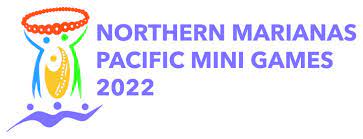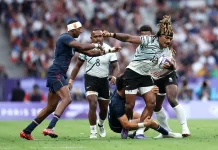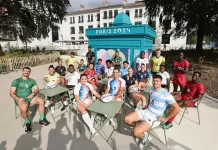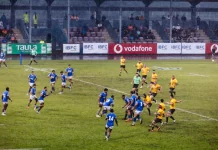It’s been eight years since the Northern Marianas were awarded hosting rights for the 2021 Pacific Mini Games.
Super typhoons, the withdrawal of government support and Covid-19 have combined to throw plenty of caution to the, err, wind – so much so that the event will now take place in 2022.
But with the government back on board and close to 90 percent of the territory’s eligible adult population having received at least one dose of the Covid-19 vaccine it’s all steam ahead in Saipan.
Pacific Games Council CEO Andrew Minogue said the successful staging of the Tokyo Olympics has given them a lot more hope that other major sporting events can also be viable.
“We’re not out of the woods yet – obviously there’s still a lot of work to do between now and June next year – but I think we all take great comfort in the fact that Tokyo happened, that an Olympic Games was delivered successfully,” he said.
“They kind of showed us all the way and we can see now since Tokyo that, particularly in Europe and the Americas, a lot of sport is opening back up to spectators and to the public and for athletes and teams to be able to move around.
“I think for us next year that’s going to be a remaining challenge is to make sure that we can get athlete representatives from all our countries.”
The CEO of the Games Organising Committee, Vicente Ben Babauta, previously worked in luxury travel retail, so is well versed in the impact caused by the global pandemic.
He hoped the Mini Games would provide a much-needed boost to the CNMI’s tourism industry, including on Rota and Tinian. With the territory having recently opened a travel bubble with Korea, he said there was a belief on the ground that people can visit the territory safely and that major events can proceed with the appropriate protocols.
“Right now the entire community is very very positive, looking forward, very excited for these Games,” he said.
“We’re starting our bubble travel with Korea…so we’re receiving an average of 2,000 travellers last month so by December of this year (it will be) closer to 7,000 travellers, so it’s a good dry run basically for next year’s (Pacific Mini) Games.”
Babauta said under the territory’s current Covid-19 protocols, athletes and officials attending the Mini Games would be required to return a negative PCR test before boarding their flight to Saipan.
Upon arrival fully vaccinated people would still have to quarantine for five days upon arrival in Saipan, while unvaccinated travellers would have to spend up to two weeks in managed isolation.
He said the CNMI is ready to facilitate a very safe environment during the Mini Games.
“As soon as they land we are responsible but of course on the athlete side and official side going back to our protocols they will be sharing before departure all their PCR, vaccine completed, other health requirement other than their immigration requirements that they will need but on arrival we will take it from here.”
The Pacific Games Council has yet to consider making Covid-19 vaccinations a requirement to participate in Saipan but Andrew Minogue said that could change.
“Our message would be to get vaccinated for your own protection, for protection of your family and your community,” he said.
“I think that’s a message that all sporting bodies around the world will advocate to their membership and their stakeholders, but as for sort of hard and fast rules around that we haven’t go to that point yet. It may come. I don’t think they got there for the Olympics but by June of next year it might be different.”
The Northern Marianas Sports Association originally bid to host the 2017 Pacific Mini Games, but lost out to Vanuatu. Unperturbed, they immediately signalled their desire to bid for the next instalment in 2021.
After 11 long years of waiting, plus an additional year-long Covid-induced delay – Ben Babauta said the CNMI cannot wait to play host to their Pacific neighbours.
“This is one event that we’re making history on, first and foremost, and just welcoming our South Pacific family into Saipan, into NMI, it’s quite important. We are working really hard behind the scenes in terms of all the protocols.”
The recent Tokyo Olympics is estimated to have cost over US$15 billion, making it the most expensive Olympic event in history.
By comparison, the CNMI Government has budgeted a mere US$4 million to stage the Pacific Mini Games, which will feature nine sports being contested across one blockbuster week of competition.
Andrew Minogue said while Japan had resources the Pacific could only dream of there was still plenty the region could learn from what happened in Japan.
“The way they managed the flow of athletes in and out of venues, how they had them perfectly quarantined in the Games Village,” he said.
“It’s something we’re going to have to work through with the on the ground conditions – things like masks, social distancing, making sure athletes have a plan in terms of where they’re going to go if it’s not at competition or the village or the training venue.”
The Pacific Games Council will wait to see what conditions are like in the first quarter of next year before making any final decisions on what restrictions and assistance will be required, Minogue said.
“How easy is it to travel? What are the quarantine rules when you get there? and we will put the plans in place accordingly for the Games.
“I’m hopeful that travel will be a lot more freely available by June of next year and we can actually get there from all the countries of the Pacific fairly easily. We will just have to be very careful with how we all manage ourselves on the ground.”
The first shipment of six va’a boats arrived in the CNMI from Fiji earlier this month, with another dozen boats from Hawaii due to reach Saipan in December.
And with less than eight months to go until the opening ceremony, Ben Babauta said the CNMI was already counting down the days.
“We have a huge countdown clock in front of our sports complex and everybody is keeping an eye on it,” he said.
“I’m like a movie star now in the community. (Everyone is saying “hey Ben good luck…you’re doing a great job.”
“It’s quite exciting seeing all the flags and presentation is important, keeping the entire community engaged, so that’s the next step is outreach. We have posters for volunteers, we’re going on the radio, we’re going on TV and just showcasing our event for next year, said Babauta.
SOURCE: RNZ PACIFIC/PACNEWS


















